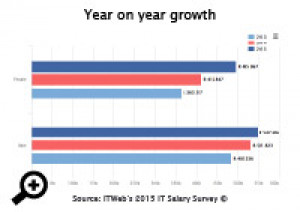
The 2015 ITWeb/CareerWeb Salary Survey has found IT salaries are up 8% from 2014, and women are making faster gains while CIOs and chief architects keep the top earner spots.
The study also found Gauteng salaries are 7% higher than in the Western Cape and the value of software development skills has grown.
These are some of the other key findings of the 2015 ITWeb/CareerWeb Salary Survey.
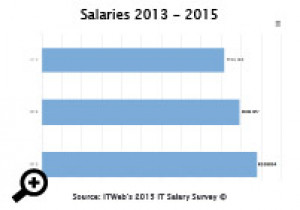
The average salary reported by the 4 649 permanently employed respondents (84% of the sample) is just over 8% up from last year, at R520 000 annually.
The ratio of male/female respondents is almost identical as in previous years (81/19), but the gap is closing between their respective average salaries. The difference this year between male and female IT professionals' annual salaries is just over R50 000, down from well over R100 000 in the past two years.
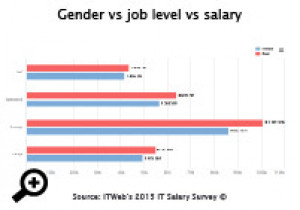
Expressed in percentages, female respondents' salaries grew by 20% year-on-year, compared to only a 3% growth for male respondents.
The biggest gap between male and female salaries remains at executive management level.
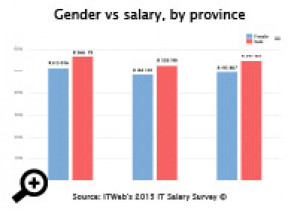
The bulk of the respondents (68%) are based in Gauteng, followed by 19% in the Western Cape. KwaZulu-Natal's share is 7%, with each of the other provinces making up less than 2% of the sample.
Overall, the Western Cape average salary lags behind Gauteng by 7%. At staff level, the gap is marginal (3%), but it widens at operational management level (8%) and jumps drastically at executive level - top IT exec salaries in Gauteng are 25% higher than those reported in the Western Cape.
Lonely at the top
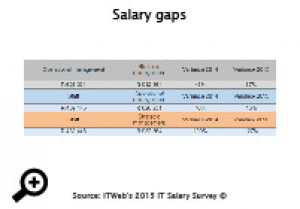
Overall, the gap between top and bottom earners has widened since last year: the difference between staff and executive-level salaries went up from 109% to 127%.
At the executive level, the average salary reported by all CIOs was up 3% from last year, reaching an average above R1.1 million.
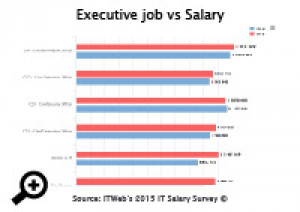
The sample of CIOs more than doubled - from 42 to 90 - testimony to the growing profile of the survey base. The number of women CIO respondents grew from two to 20.
Only the CSO sample remains meagre - with just two respondents - hence the anomaly of the average annual salary dropping from last year.
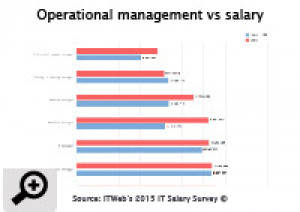
Enterprise architect has been the highest-paid senior (middle management) profession year after year. The average annual salary reported this year is R782 551, up 4% from 2014.
Architect salaries are followed by data warehouse managers and business development managers.
Interestingly, while overall Western Cape salaries lag behind Gauteng's by 7%, the difference for enterprise architects is only 3%, pointing to the fact that skills in highest demand command similar pay across regions.
Best-paid staffers
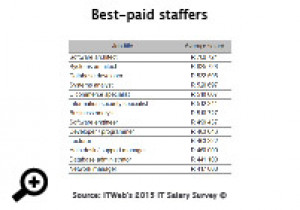
Software architect (R700 720) and systems architect (R625 728) are the best paid jobs at staff level on an annual basis.
The results reflect approximately 32% of primary platforms and expertise that command higher salaries in the Western Cape: mobile solutions/enterprise mobility, enterprise architecture, business intelligence, call centre management, content management, change management, and HR and payroll.
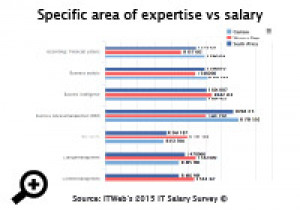
"IT in the Western Cape is more driven by foreign investors, start-ups and SMEs," comments Harriet Smith, branch manager at Communicate Personnel, Cape Town IT. "There's a large number of innovative but smaller IT companies, with tech-driven work and smaller teams: owner, development manager and team.
"Candidates have more scope to become involved in more aspects of the company. This lack of corporate hierarchy structure means personnel take on more roles within the company which could be a reason for higher Western Cape salaries, as they are required to develop, test and analyse. These businesses generally have flatter structures and less tiers than the industry corporates/corporate gradings of Gauteng, and the IT market is generally non-corporate."
Best-paid specialisations
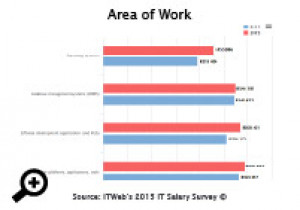
The survey offers different views into broader and more specific tech expertise and the respective earning potential.
First, we divide tech skills into four broad areas of IT specialisation: operating systems, database management, software development and vendor platforms.
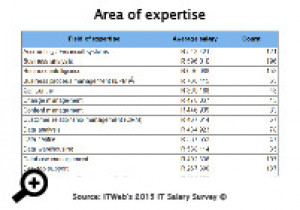
This year, software development took the second-best paying spot, edging out database management. Enterprise-level vendor platforms (such as SAP, Oracle, IBM, etc) retained the top position.
Looking more closely, we asked respondents to identify their more specific function within their organisation, from accounting systems and business analysis, to systems and network management to Web development.
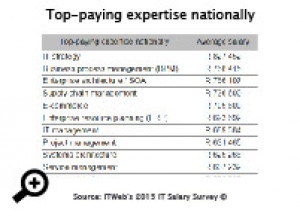
Sorting those average salaries from largest to smallest yields a predictable result: IT strategy, BPM and enterprise architecture take the top three spots, with other enterprise disciplines following closely.
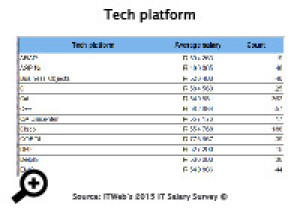
Finally, we ask respondents to identify the primary vendor platform they specialise in - from ABAP and Asp.Net to XML.
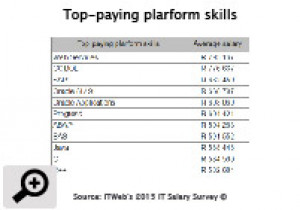
Looking at those that command the highest average pay, Web services, Cobol and SAP top the charts, followed by Oracle database and Oracle applications skills.
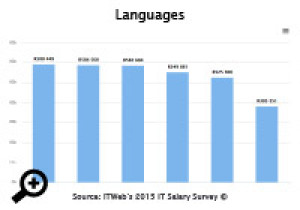
Communicate Personnel's Smith says one of the hardest roles to fill is that of experienced, skilled developer as they are in short supply.
When it comes to those who have software development as their primary expertise, Java, C, C++ and C# developers top the best-paid list, all averaging over R580 000 a year.
Women skill up
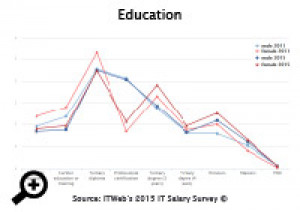
Another interesting fact revealed is that the percentage of women opting for higher education is consistently higher when compared to their male counterparts, who have gone the vendor certification route more often - not surprising considering the history of the IT sector.
Looking at the education data since 2011, across both genders the level of education is shown to be increasing. In certain cases where women were better off four years ago, they have maintained the gap or increased it, with tertiary education and professional certification rising in general among women from 40% to 48.4%, and their male counterparts from 35% to 40%.
How the survey was done and who responded
The 2015 ITWeb/CareerWeb Salary Survey captured a total of 5 367 valid responses. It was conducted in early 2015 via an online questionnaire, and as such, it does not have a controlled sample. The results report is meant to serve as an indicator of local IT salary trends.
The majority (84%) of respondents are permanent employees, and 68% live in Gauteng, followed by 18% in the Western Cape and 7% in KwaZulu-Natal.
Respondents include C-level executives, middle managers, and a wide range of staff-level IT personnel, ranging in age from under 20 to over 50, and from organisations with fewer than 10 people, to multinationals with more than 5 000 employees.
The gender ratio exactly matches last year's sample, with 82% male and 18% female respondents respectively.
NB: The salary figure reported is average annual package, cost to company (before deductions).
Related story:
Western Cape tech salaries: expertise cashes in - Salary Survey 2015
Share